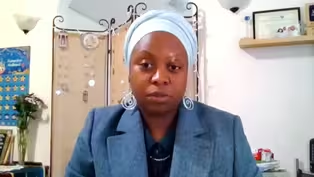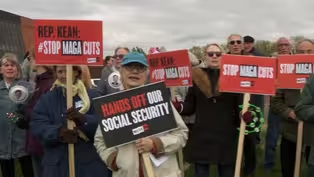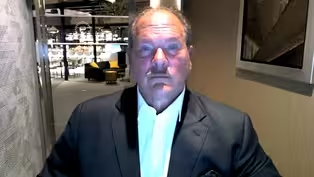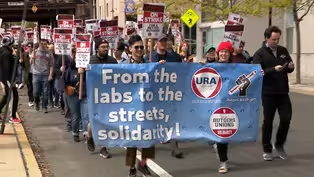NJ Spotlight News
NJ Spotlight News: April 18, 2023
4/18/2023 | 26m 46sVideo has Closed Captions
Watch as the NJ Spotlight News team breaks down today's top stories.
We bring you what's relevant and important in New Jersey news, along with our insight. Watch as the NJ Spotlight News team breaks down today's top stories.
Problems playing video? | Closed Captioning Feedback
Problems playing video? | Closed Captioning Feedback
NJ Spotlight News is a local public television program presented by THIRTEEN PBS
NJ Spotlight News
NJ Spotlight News: April 18, 2023
4/18/2023 | 26m 46sVideo has Closed Captions
We bring you what's relevant and important in New Jersey news, along with our insight. Watch as the NJ Spotlight News team breaks down today's top stories.
Problems playing video? | Closed Captioning Feedback
How to Watch NJ Spotlight News
NJ Spotlight News is available to stream on pbs.org and the free PBS App, available on iPhone, Apple TV, Android TV, Android smartphones, Amazon Fire TV, Amazon Fire Tablet, Roku, Samsung Smart TV, and Vizio.
Providing Support for PBS.org
Learn Moreabout PBS online sponsorship>> Funding is provided by the New Jersey education Association , making public schools great for every child Barnabas health.
Let's be healthy together.
And -- committed to the creation of a long-term, sustainable energy future for New Jersey.
>> from NJ PBS, this is NJ Spotlight News.
>> good evening and thanks for joining us.
It is not the professors, but the doctors and health care workers at Rutgers University today marching in protest.
Two of the three striking unions announced a tentative deal with leadership, but the union representing about 1300 nurses, pharmacists and doctors has not.
They are still negotiating demands and reminded the university their contracts are still in limbo by marching through the streets.
David Cruz reports.
[chanting] >> The union representing over 1000 doctors, and other health care professionals and researchers, is still without a contract.
Today they marched through downtown New Brunswick to make that point.
Catherine Monteleone is president of the union representing medical staff who agreed to suspend their strike despite not having any of their demands met.
>> the governor offered a lot to the union and there is no way we are going to let them down to not take that.
But we can go back out again if we have to.
We have support of the other unions.
We didn't finish because we wanted them to get what they could get.
Our issue will now be taken up.
>> Medical staff see patients, teach and mentor and help with research but the framework reached last week failed to secure pay increases, paid family leave, job protections for new were workers and the opportunity to do more than just see patients.
>> one of the biggest ones is protected academic time.
They would like to take that away from us and make us just do clinical time and make money for them.
We came here to teach do research and teach the next generation of professionals and that should be codified.
>> Our faculty props up the system.
We prop up the system.
We cared for patients when there was no vaccine or treatment.
We thought COVID was a death sentence and we were terrified.
Our doctors were here when others weren't.
So many people fled and closed their clinics.
Where were we?
We were right here.
>> I am humbled by the support we have seen because I thought I was alone.
I thought this was something I was doing by myself but it is powerful to see that everyone else is having the same problem and if we come together and support each other, we can make a better deal.
I know people are going to get tired, but we are going to move forward because education is important.
>> Governor Murphy, who brought the two sides together and has gotten a lot of credit from those involved, was on TV this week seemingly promising that no one would be left to foot the bill.
>> You can't balance the budget anywhere on the backs of taxpayers.
>> That will take real political next Arity because as a public institution, Rutgers, like the rest of colleges and universities, relies on the legislature.
Some lawmakers have already said they are not interested in making a Rutgers bailout something other state schools might also expect.
>> Progressive groups are eyeing Congressman Tom K Junior's seat, rallying in Bridgewater, calling on the representative to host a town hall for constituents so they can directly ask him questions about his votes in Congress.
New Jersey working families alliance led the demonstration.
Executive Sue Altman is likely considered to be the candidate to challenge Kane.
The rally coincides with Kane's first 100 days in office.
He has been criticized for holding too few public events.
His office today pointed to the 34 bills he has sponsored or cosponsored.
And to the thousands to which he has responded.
Election finance reports this week show Kane is outweighs think -- out raising other members, just another indicator he is likely to be heavily targeted in the next election.
>> We are working with icing 50 groups who signed onto a letter demanding Tom kind -- and we are here to demonstrate support for that idea.
He was elected to represent this district and if he is not going to bother to hold a town hall, how is he doing his job?
That said, accountability has to happen whether I am running or somebody else is running.
The most important thing is that time Kane listens to his constituents.
>> Don't be surprised if you no longer see masks at the doctor's office.
The statewide mandate requiring masks has been lifted with little to no mention from the governor's office.
The order was one of the last remaining government issued pandemic mandates.
Hospitals and health care facilities can adopt their own mandates and nothing is stopping patients from wearing one.
The governor's office pointing to COVID-19 numbers dropping significantly as of last week.
The state health department is reporting 636 new cases today.
All 21 counties are under what the CDC calls low community levels of the virus.
Evan Gershkovich will remain in a Russian jail until the end of May.
He appeared in court in Moscow today, the first time he has been seen in public since March 30 after he was detained on charges of spying.
He looked at ease, with arms folded, standing in a box used to hold defendants in Russian courts.
The court rejected his legal team's offer to free him on bail or put him in house arrest.
The U.S. government declared him wrongfully detained as he and the Wall Street Journal continue to deny the allegations which come amid bitter tensions between the West and the Kremlin.
His family recently spoke exclusively to the journal about how they are holding up amid his detainment.
>> It is one of the American qualities that we absorbed, be optimistic.
Believe in happy endings.
That is where we stand right now.
But, I am not stupid.
I understand what is involved.
>> Passport delays frustrating federal lawmakers.
Bob Menendez said he is working to address the backlog, putting the State Department on notice and asking the agency to find ways to shorten the processing times for passport applications.
The federal government is fielding half a million applications a week.
Wait times are up to three months at least, all due to an increase in post-pandemic travel.
At a press conference, Menendez said his office has been inundated by calls from panicked travelers.
He is asking constituents to have patience and wants the State Department to improve online renewal, which was shut down in March after users reported problems.
Roughly two and a half years after being signed into law, the environmental justice measure is officially in effect.
Officials say it is the first law in the nation that can deny permits to polluting facilities if analysis proves their operations will negatively impact overburdened communities.
Typically low income minority neighborhoods that experience a disproportionate amount of environmental harm.
The law comes too late to block some of the state's most controversial proposals for power plants.
I am joined by the Executive Director for New Jersey environmental justice alliance.
We now officially have this rule in effect.
What is in it.
Which of these new rules to?
>> the rules fill in for the law.
If the law is the intent and the rules are how you execute the law.
And having the law, we already had the promise of protections.
The rule is how we get the enforcement we need for communities.
>> Do they live up to what the goal of the law is intended to be?
>> Absolutely.
The process we got from the law to the rules was a long process.
It was difficult for communities that saw the polluting facilities and the time between the law and the rules being released.
But, lots of public input was taken.
Almost 500 individuals around the state weighed in on how this law should be enacted.
There was a robust public comment process that basically mirrors what we want to see happening through the execution of the law.
>> I'm thinking about these environmental justice communities over the last two and a half years.
Where there were permits that got approval.
So, these projects are moving forward.
How does this affect those communities?
What are they saying about this?
>> The current system of how permits were approved has been a problem for decades.
This was what led to the law.
Advocates were tired of fighting facilities one at a time without the regulatory authority to say no on the basis of cumulative impacts.
What happens and what is happening and work and Woodbridge with permits that win didn't before the rules took effect is the same thing that has been happening for decades.
The release of the rules is where the story changes.
>> Did the DEP do a good job of acting in the spirit of the law while they were under the administrative order?
>> We would have liked to have seen an executive order.
We would love to -- we would have loved to see a moratorium.
What we got was an administrative order.
It was not the best case scenario.
What it did, if anything, was get -- it helped us as advocates see what kind of community engagement will need to happen as the law takes effect.
One of the main pieces of the administrative order into the law is robust public process.
The public has to be involved, so that is where EJ advocates come in and where our work ramps up.
People need to know what is happening in their community and be prepared to speak about it.
>> Melissa Miles, thank you for your insight.
>> You're welcome.
>> You can read more about the states new environmental justice law by tech -- NJspotlightnews.org.
Another wildfire has broken out in Burlington County.
It comes as the state forest fire service today gave a glimpse of what could be ahead this season.
Three major wildfires ripped through the state just last week.
According to recent data, it has already been an unusually active year with 500 wildfire sofar burning more than 7600 acres.
The rise in wildfires is due to weather conditions and climate factors like new snowfall, high wind, look -- low humidity and a warm season that has been extended by about a month.
Officials say the three fires from last week are contained, but smoldering they were in Manchester, Ocean County, West Milford and little leg harbor.
In our spotlight on business reports tonight, a big win for New Jersey.
The U.S. Supreme Court unanimously ruled today allowing of the state to exit the waterfront commission of New York harbor, an agency created in the 1950's to serve as a watchdog against corrupt labor practices.
New Jersey lawmakers called for an end to the commission, citing a change in industry and less influence of organized crime.
New York suits to block New Jersey's exit, but in a decision written by Brett Kavanaugh, the higher court says the state has sovereign authority to withdraw from the commission.
In a statement, Governor Murphy said he was thrilled.
Adding, for many years, frustrations have been building.
I am proud that after a five-year battle in federal courts where my administration used every legal tool at our disposal, you -- New Jersey's sovereign rights have been vindicated.
A volatile day on Wall Street.
Here are the closing numbers.
>> Support for the business reports provided by New Jersey American water.
We keep life flowing.
>> Ahead of today's Holocaust remembrance Day, Governor Murphy signed a bill aimed at improving the way the Holocaust and genocide are taught in New Jersey schools.
The law requires students be tested on the subject as part of a state requirement.
It comes at a time when anti-Semitic incidents are on the rise across the state.
People from around the world today gathered in Poland for the annual March of the living where participants walk a nearly two mile path from Auschwitz to Birkenau, the largest Nazi concentration camp, recalling victims and survivors of the Holocaust.
Among them, an international group of law enforcement officials from New Jersey.
The trip was organized by the Rector Center on community resilience.
Its chief policy advisor Paul Goldenberg joins me as part of our ongoing series focusing on anti-Semitism, racism and extremism.
It is good to have you join us from Poland.
What do you see as the Miller Center and law enforcement possible in participating in this?
>> this has been going on for over three decades.
This is really the first time the organized policing community, the transnational community, participated.
The kernel of the New Jersey state police Pat Callahan and his Lt. Col. attended as well.
Here we are thousands of miles away from New Jersey and as we marched alongside the others, we could hear from the sidelines, "the New Jersey State police is here."
It was a positive impact.
>> What do you hope to get from being part of this?
Why was it important to make that presence known?
>> Unfortunately in the 1930's and 1940's, some police were on the wrong side of history.
It was an absolute message to send that the police executives that attended today were there to support not only the Jewish community, the fight against anti-Semitism, the fight against hatred and bigotry in that we are very much a part of the solution.
>> Anxieties are high in New Jersey amid a rise in anti-Semitic incidents.
How does that play into your participation?
>> police or first responders.
When police are properly trained , and they properly investigate, there is a distinct message sent to those that seek to cause harm against not only the Jewish community, but any vulnerable community.
The training of police officers in Holocaust education, it is not just about remembrance, it is what lessons can be learned?
What can police learn from this?
That message was clearly resonated today amongst the 10,000 people >> many of us will never get to experience what you all did today.
Can you briefly take us inside what it felt like?
>> police executives over a period of 30 years, I have two and a half decades in the business.
There is not that much we have not seen in that period of our lifetimes.
But when you stand in front of a crematorium, when you stand in front of a place where 1.2 million people were killed, executed because of their religion, it has a remarkable impact.
Being able to take that and transition it back to their officers vis-à-vis training and really setting the tone within these departments that hatred and bigotry can lead to something like this in modern times, the police have a very important role, a very important part in preventing something like that have ever occurring again.
>> Paul Goldenberg, Rutgers.
Thank you so much.
>> Thank you very much.
>> Finally, April is National donate life month and it has a particularly special meaning for one mother and son.
In need of a donor, without a match.
They turned to the idea of living donation.
Now they are sharing their inspiring story in hopes it will encourage others to make the same life-changing and lifesaving decision.
>> For Leslie, her son has always been her whole world.
>> he was a beautiful little brown boy.
Always smiling.
Such a pleasant child.
>> There was nothing she wouldn't do to protect him.
So when Mari was diagnosed with a rare kidney disease, she was devastated.
>> It was predicted that this now 22-year-old young man would develop complete kidney failure within 10 years or so.
Unfortunately in his case, he went from diagnosis to failure and about four years.
As a result, he had been on dialysis three times weekly for little more than six years.
>> He needed a new kidney.
She was ready to donate.
But she wasn't a match.
Instead, she made a decision to pay it forward.
Donating one of her kidneys to a stranger as part of an organ swap.
>> We had tried different Facebook campaigns, T-shirts and different things like that to advertise that he needed the kidney.
Ultimately, I got the word and the kidney transplant was scheduled.
>> In May of 2021, her generosity paid off.
Amari received the gift of life once again from his mom.
>> I felt the immense love and sacrifices she had for me.
More love I already had for her.
>> But Amari is one of the lucky ones for the process of getting an organ is not easy.
There are roughly 104 thousand people waiting on the transplant list with one person added every 10 minutes.
While there were more than -- performed last year, 17 people die every day still waiting.
>> although we continue to procure and transplant an increasing number of donor organs, that increase is not keeping up with the increase of demand.
>> One of the doctors involved in this procedure says living donor donations are critical.
>> Until the advent of successful Zeno transplantation when we can order organs off-the-shelf from a porcine donor, until that becomes reality, our supply will always under serve the need.
>> If it weren't for people like Leslie, a lot of this wouldn't be possible.
We are grateful.
It allows us to do our job and the ability to help patients who have kidney disease or other organs.
>> Nearly two years since getting his new kidney, Amari says it has been life-changing.
>> I have been able to pursue my goals that the kidney put on hold.
I started a music company I was working on and working full-time, which I was not able to do on dialysis.
>> If they could take my other kidney, I would do it again.
[LAUGHTER] I wouldn't mind being on dialysis.
But Emma just to see your loved one with a renewed life, it is unbelievable.
>> A mothers's love is always a gift that never stops giving.
>> That is going to do it for us tonight, but some exciting news to share.
Our digital film series 21 is a finalist in the webby awards, nicknamed The Oscars of the Internet.
It is an international contest that recognizes the best in podcasting, video and original content.
We know it is an honor just to be nominated, but we really want to win.
Show your jersey pride and help us by voting.
Click on the graphic to find out more and vote for the 21 Essex County episode.
Voting closes April 20.
For the entire NJ Spotlight News team, have a great evening.
♪ >> Announcer: serving the insurance needs of residents and businesses for more than 100 years.
New Jersey realtors, the voice for real estate in New Jersey.
More information is online.
And, the PSEG foundation.
Leadership support provided by the Sylvia a and Simon B programming and down meant to fight anti-Semitism with additional funding from Sue and Edgar Wachenheim.
The Peter G Peterson and Joan Ganz Cooney Fund.
Additional support provided by the tiger Baron foundation.
And Josh Weston.
>> look at these kids.
What do you see?
I see myself.
I became an ESL teacher to give students what I wanted when I came to this country.
The opportunity to learn, to dream, to achieve.
A chance to belong and be American.
My name is Julia and I am proud to be an NJ EA member.
♪
Another wildfire breaks out, this time in Burlington County
Video has Closed Captions
Clip: 4/18/2023 | 1m 2s | In a very active wildfire season so far, 517 fires have burned more than 7,600 acres (1m 2s)
Cheering the adoption of long-delayed pollution regulations
Video has Closed Captions
Clip: 4/18/2023 | 4m 28s | Interview: Melissa Miles of New Jersey Environmental Justice Alliance (4m 28s)
Critics of Kean rally, urge congressman to hold town hall
Video has Closed Captions
Clip: 4/18/2023 | 1m 39s | The demonstration was led by the New Jersey Working Families Alliance (1m 39s)
A mother donates in organ swap, son gets new kidney
Video has Closed Captions
Clip: 4/18/2023 | 4m 37s | Leslie Pooser Osei-Tutu wasn't a match to donate to her son Omari (4m 37s)
NJ can withdraw from the Waterfront Commission
Video has Closed Captions
Clip: 4/18/2023 | 1m 17s | The high court said the state has sovereign authority to withdraw from the commission (1m 17s)
NJ law enforcement delegation joins Holocaust walk
Video has Closed Captions
Clip: 4/18/2023 | 7m 33s | The annual March for the Living goes from Auschwitz to Birkenau (7m 33s)
Rutgers health care workers march, still await contract
Video has Closed Captions
Clip: 4/18/2023 | 3m 43s | 'We have the support of the other unions and they know that we didn't finish' (3m 43s)
Providing Support for PBS.org
Learn Moreabout PBS online sponsorship
- News and Public Affairs

Top journalists deliver compelling original analysis of the hour's headlines.

- News and Public Affairs

FRONTLINE is investigative journalism that questions, explains and changes our world.












Support for PBS provided by:
NJ Spotlight News is a local public television program presented by THIRTEEN PBS






